
With the Silent Hill HD Collection being lambasted by fans and critics (my review now available here!), I thought I’d take a moment to discuss exactly why I feel it was so important for the original voice acting of the games (Silent Hill 2 specifically) to be retained. And it isn't just a matter of personal preference based on my familiarity with the original actors; although, that is definitely a contributing factor.
Critics tend to make a simple equivocation fallacy when describing the voice acting of Silent Hill as "awkward" and then calling it "bad". But "awkward" does not necessarily mean "bad". In fact, the awkward voice acting of Silent Hill 2 is actually a benefit to the game's narrative and mood. This is something that should be apparent to anybody who is actually paying attention to what's happening in the game.
Let us first take a step back and look at the design principles that went into Silent Hill 2.
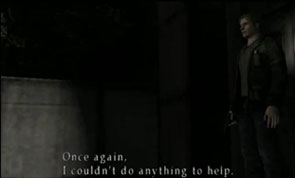
Is there any greater horror than the loss of a loved one?.
Silent Hill 2 is a particular kind of horror game. It differs from other horror games at the time - such as Resident Evil and even its own predecessor Silent Hill - in that it is a very emotional brand of horror. The horror doesn't come so much from being "afraid", but rather, from being depressed, confused, and unsure of what is going on around you. It forces you to think about your own mortality and the mortality of the people who you care most about, as well as the things you'd be willing to do to keep them with you for just a little bit longer. It also forces the player to think about how vulnerable your own mental state is, and how easy it can be to break your own mind, or have it be broken by someone else.
Silent Hill 2 is a very dark and gloomy game, and definitely deserves its "M for Mature" rating with its story and themes alone. Team Silent accomplishes this by immersing the player in decrepit environments and introducing elements of surrealism to the game's reality. They then supplement this by slowing breaking down the foundational pillars of what the main character thinks is real, and then forcing the character and the player to wonder whether their own senses can be trusted.
Every element of the game's design reinforces these goals.
As mentioned above, the environments are mostly normal and harmless locations: the streets of the town, an apartment building, a lakeside city park, a bowling alley, and a hotel. But each of these seemingly innocuous locales is made to be a little bit twisted. In addition to the creepiness of being in any abandoned, decrepit environment, these locations are all just a little unusual. Individual locations sometimes appear as caricatures, with the previous inhabitants all seeming to have been bat-shit crazy, and leaving the mark of their craziness on their surroundings. On top of that, the whole world seems to be frozen in a state of either being built up or being torn down (much like James' own world-view), with physical barriers constraining James to a linear path without compromising the feeling of openness in the world. Despite being abandoned, there is an odd order to the world. As if the world itself is consciously guiding James through it (it is).
We're all familiar with hospitals, so you would think that Brookhaven's creepiness would come from people's innate discomfort with hospitals. But this game's hospital goes above and beyond, as it is a mental institution rather than a traditional hospital. The game doesn't outright tell us that this is the case, but it gives us not-so-subtle clues as to the nature of the facility that should be obvious to anyone paying attention. This hospital, as you'd expect, had been occupied by crazy people, and their handiwork literally litters the place. Later, we visit an antiquated, rusty prison. Once again, the character is immersed in a world of bat-shit crazy minds and criminals. Being surrounded by crazy (not to mention monstrous creatures) makes the player feel uncomfortable, and makes you begin to question your own sanity. Maybe James belongs in Brookhaven? Maybe he belongs in prison?
Speaking of the monsters, they are some of the most unique in gaming history. They straddle the line between organic and synthetic (in much the same way as H.R. Giger's Alien, but with a completely original aesthetic). They are mostly trivial to deal with in terms of combat, but they’re just weird and almost sad to look at. Are they people? Are they monsters? Should I feel bad when I kill them? They are even close enough to looking human that the very act of fighting them can be desensitizing to the player (and James) with regard to the violence he will have to commit against real people later in the game.
Creepy music and sound effects are a staple of Silent Hill, but the industrial grating from the first game has been replaced with the somber, depressing muse of James’ dead wife and shattered psyche. Even the ear-splitting wails of the monsters sound of pain and anguish, rather than aggression and animalistic brutality.
Even the myriad choices that James is presented with give the player a sense of uncertainty!
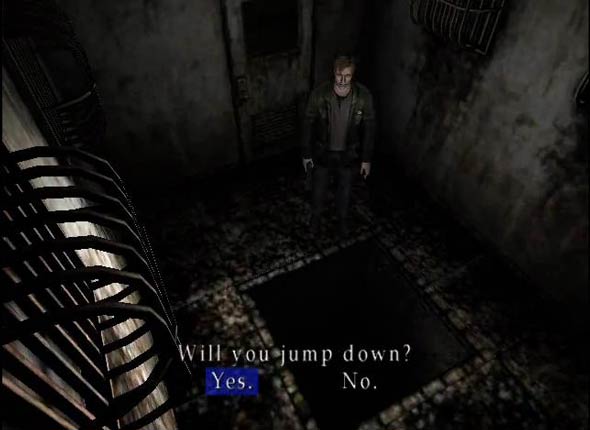
"The hole is dark and I can't see anyting. Will you jump down?"
Um... Do I have to...?
If I’m supposed to jump down the hole, then why would they ask me if I want to? Is there something else I’m supposed to do? Somewhere else I can go? Should I go back the way I came? Similarly: could I not reach my hand into the creepy hole in the apartment wall? Is something going to eat me if I do? Just when you start to develop a sense of comfort, the game throws one of these "Will you…?" prompts to reinforce your uncertainty with the reality around you and make you question the path you've taken.
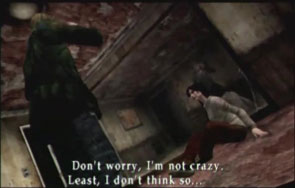
James begins to doubt his own mental stability
All of these elements of design combine to create a world full of depressing uncertainty and doubt. Doubt in James' own mental stability. Doubt in whether or not what is happening to you is real. Doubt in whether or not Mary is even in Silent Hill.
It’s funny that people are so able and willing to recognize – and praise – the game for the contribution that the environments, monsters, music, sound, and puzzles all make to the narrative, but then they forget to apply these same design philosophies when the topic of voice acting comes up.
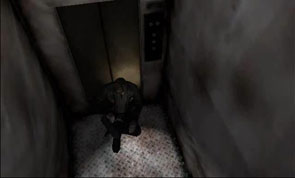
Silent Hill 2 is more than a little depressing
Every element of the game is carefully crafted and planned to create a sense of unease, anxiety, and snowballing distrust within the player. Every aspect of the game is designed to feel awkward and uncomfortable. It’s possible that it was all a happy (or is it unhappy?) coincidence, but its pervasiveness in every element of the game’s design makes it almost certainly not an accident.
Like every other element of the design, the "awkward" voice acting reinforces the game’s themes, moods, and design philosophies.
As soon as you meet any of the characters in Silent Hill 2, you immediately get a sense that something about them is not quite right. They don’t behave or talk like anybody that you’ve ever spoken to (hopefully). They're hesitant to offer personal information, quick to feel threatened, and easily agitated. The awkwardness is even reinforced by their body language. They often avoid eye contact, and instead look at their own feet or stare off into the distance when they converse. Their bodies are constantly on edge, as the characters fidget and twitch and show obvious signs of pain, discomfort, and confusion when engaged in simple conversation or asked simple questions. And all of this applies to James as well. Maybe this was just the animators going wild with the new tech that allowed them to create more expressive characters than the talking-cardboard-cutouts of the first Silent Hill game. Or maybe - just maybe - it was all intentional design.
These conversations seem unnatural and almost unbelievable. But that isn’t a fault or an error. It’s exactly what the game’s designers want you to feel!
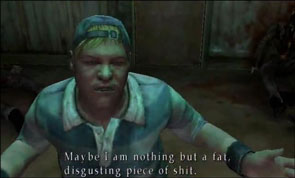
Eddie has issues. So does everyone else.
The honest truth of the situation is that all of these characters do have something wrong with them. They aren’t quite right. They are broken! The whole point of the game is to reveal how and why these characters are all psychologically broken and then to show the player how these characters mirror elements of James' own subconscious. The way they talk is just one clue for James and the player that all is not what it appears to be.
Part of the game’s horror is the combination (and contrast) of both sympathy and involuntary repulsion that the player feels towards the other characters. Through the awkward, unpleasant character interaction, the game slowly trains you to feel on uncomfortable - or even on edge - whenever another human being is present. Then it makes you uncomfortable about James himself. It reinforces the ideas of isolation and loneliness, even when another person is standing right there next to you (or actively following you as a companion). It makes you feel sad, alone, and vulnerable.
Trust no one.
In Silent Hill, Harry was able to rely on Cybil for most of the game. She acts as a bit of a safety net for both Harry and the player before becoming a liability towards the end. In Silent Hill 2, none of the secondary characters seem even remotely trustworthy or dependable. They are all liabilities. Nothing that they tell you is to be taken at face value. This is apparent from the moment they open their mouths.
The awkward voice acting of Silent Hill 2 isn’t a fault or liability. It’s a triumph of design. It’s one perfectly-shaped piece in the game’s complex jigsaw of emotional story-telling. Anybody who tells you otherwise either didn't play the game, or didn't understand it.